Jambo, I'll Have Your Money Now, or, A Week in Nairobi
(Marie-mail #56)
NAIROBI
OCTOBER 5
A taxi driver left me in downtown Nairobi. There were a few hotels I
wanted to check out.
Kenya, according to my guidebook, had the world's third biggest gap
between rich and poor. And Nairobi, nicknamed "Nairobbery," is reputed to be a
lawless city, where tourists and locals alike are subject to frequent muggings
and confidence scams.
With my big backpack and pale skin, I was an obvious target. Beggars
followed me, touts shoved safari and hostel brochures in my face and kids
demanded money for school projects. With a little "seasoned traveler"
surliness, I was able to deflect all, finally settling on a $13 a night hotel
called "Parkside," possibly due to its scenic location on the outskirts of a
squalid block of green.
I collected the gear I'd left at the Boulevard Hotel the week before
and headed to a travel agent.
"Is it possible," I asked the Flight Centres agent, "for me to go to
Masai Mara and go on the balloon safari, and return to Nairobi the same day?"
She thought a minute, and then made a few phone calls.
"You can go tomorrow with one safari, stay overnight at the camp, go on
the balloon safari on Sunday morning, and return Sunday afternoon with a
different safari."
But it would cost me. Four hundred dollars for the balloon and
accommodation. I knew the balloon price tag was a rip-off, but the website
readers had voted "yes" to "should Marie go over Masai Mara in a balloon" and
in the long run, four hundred dollars was nothing. I wouldn't remember the
price in ten years. I would remember the balloon ride.
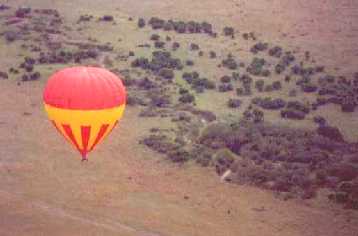 Vote "yes" for the balloon ride!
Vote "yes" for the balloon ride!
Mission accomplished and paid for, I went to scout out hair salons and
photo shops. Toddlers barely able to walk or speak swarmed me demanding money
and pens.
One man fell into step alongside me.
"Still walking, huh?" I didn't know what he was talking about. I'd
never seen him before and hadn't been walking for long. I made a noncommittal
noise. "You don't remember me, do you?" he asked. I stifled a giggle.
The "remember-me-from-the-hotel" scam was well documented in the guidebook and
on the "Lonely Planet" website. I shook my head.
"John. From the hotel," he said.
"I'm not staying in a hotel," I lied.
"I mean the hostel. You don't recognize me out of my uniform."
"I'm not staying in a hostel." I looked at him levelly.
He knew I was on to him.
"Son of a bitch," he snarled and strode away. I was too surprised at
his anger to correct his English usage. I'm no one's son.
Others were more direct. Young men would walk up to me, ask my
nationality and then invite me to a souvenir shop. One guy asked where I was
from.
"New Zealand," I said, tired of being targeted as a rich American.
"New Zealand! I am going to university there next year. Can you tell me
about it?"
I thought back to the "Lonely Planet" warning.
"A good tale currently doing the rounds involves a well-dressed young guy who, by some fantastic coincidence, turns out to be going to a university in the town/city/tiny island off the Baltic coast that you come from. After a convincing and friendly chat, it turns out that he's a bit short of cash and could use a loan... and why not? After all, you'll almost be neighbours next year."
I mumbled something about a lot of sheep and Xena before bolting.
Next time, I resolved, I would make up a country and see if they were going to
university there.
I headed back to the Parkside early. I wasn't brave enough yet to
wander around Nairobi after dark.
NAIROBI TO MASAI MARA
OCTOBER 6
Breakfast was included in my room price.
"Coffee?" asked the Parkside waiter.
"Black, no milk," I responded.
"Fruit?"
"Yes."
"Bacon and sausage?"
"Bacon."
"Eggs?"
"Scrambled."
"Toast."
"Yes." I resisted the impulse to say "toasted."
The waiter brought me milk and coffee, fruit, sausage, scrambled eggs
and toast. Many things in East Africa came out a little slow and a little
wrong. Eventually, you just accept that ordering is a crapshoot, and enjoy the
suspense of waiting on your surprise meal.
I checked my e-mail around the corner at an empty internet cafe. The
screensaver was a map of the world. Enormous red arrows indicated both the
distance between Kenya and the USA, and the distance between Kenya and
Afghanistan. The point was clearly to illustrate that Kenya was geographically
too close for comfort to any action the US took against Afghanistan, whereas
the US was a comfortable distance away.
Planet Safaris picked me up at nine. Hannah, a Czech-Seattle
documentary producer, was already on board. Like me, she was on the two-day
Masai Mara plan, but was not going on the balloon safari.
The driver left us alone in the van while he ran into the Planet Safaris
office. A beggar kid kept opening the van door, trying to get our attention.
The driver returned and cuffed the kid, who left sulkily. Hannah and I were
both stunned, not being accustomed to smacking unruly children we didn't know
(or did know, for that matter).
 en route to the Great Rift Valley
en route to the Great Rift Valley
An Australian family of five joined us and we drove past Westlands and
out of Nairobi.

Our driver was named Paul, and at first I thought he was winding Hannah
up with all his tales of how he'd control his wife if he had one. But as the
day wore on, it became apparent that Paul was a simple man, who suffered from a
shortage of active brain cells.
 on the way to Masai Mara
on the way to Masai Mara
We drove up the paved road to the Masai Mara turnoff, and then the road
turned to dirt. It started to rain and the dirt turned to thick mud. Paul
demonstrated his lack of sense by constantly driving through deep puddles
even though the slightest dampness made our van conk out. We'd have to sit,
waiting for the distributor to dry before the engine would start again. After
the first three times, even the children on board would scream "drive around
the puddles." But Paul took no heed of his group of backseat drivers.

Masai Mara is Kenya's most famous game preserve, and is also the
northern part of Tanzania's Serengeti. It is perhaps the most
visited parks in Africa. I was disturbed to spot far more safari vehicles than
animals. At one point, over 25 Land Rovers surrounded a group of cheetah.
 crowded safari
crowded safari
Still, it wasn't an unpleasant day. The Australian children, upon
spotting their first giraffe or elephant, would squeal with infectious
excitement. My jaded "I've-seen-1,000-elephants" cynicism vanished as I saw the
animals through fresh eyes.
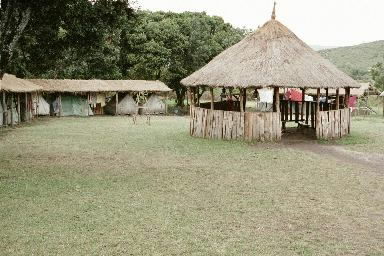 Planet campsite
Planet campsite
Just before sunset, we pulled into Planet Safari's campsite. It was run
by Masai, and consisted of several permanently erected tents around a concrete
kitchen/dining area. I ate some potatoey-goo with chicken, and retired to my
tent.
MASAI MARA TO NAIROBI
OCTOBER 7
There was a rustling outside my tent.
"Madam, balloon?" whispered a Masai warrior.
It was 4:20 a.m.
"Yes, I'm awake." Probably my immediate neighbors were awake as well,
cursing me for my early morning wakeup call by the selfless Masai.

"Okay, you have shower," pronounced my alarm clock.
Huh? I hadn't seen a shower. But I did hear running water so I unzipped
my tent and took my flashlight to have a look. There was a tap and a bucket. I
cupped my hands and splashed water on my face. That was my shower.
I used bottled water and my faithful stainless steel mug to brush my
teeth. I adored my mug. It had helped me brush my teeth, and fed me instant
soup throughout the world.
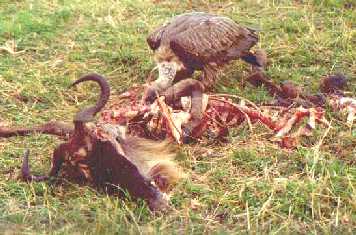
Amos, the balloon company's driver, showed up at five. His Land Rover
also contained a blond San Diego couple. They were determined to carry on with
their travels in spite of world events. They were open, tolerant, patient, and
informed. I found myself wishing that more Americans like them were abroad at
the moment, to negate the bad press Americans were getting.
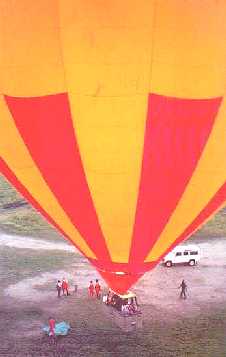 lifting off
lifting off
After an hour of driving through the dark, we arrived at a lodge, where
the balloon company stuffed us full of coffee and then sent us up in a balloon
piloted by a comedian who had once taken Michael Palin up in a balloon.
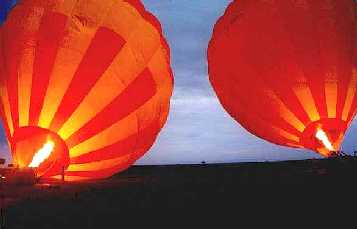 putting air into the balloons
putting air into the balloons
The idea of ballooning over Masai Mara is that you are not restricted
to roads. Not that anyone else was -- safari operators seemed to ignore the
placement of roads, and blazed new paths on whims. The practice of driving off-
road was, of course, highly illegal, and no doubt Kenya will have to crack down
at some point.
There were enough tourists to fill two balloon baskets, and the gas
flames dramatically lit our upturned faces. Up we went, into the gray dawn.
It was drizzly, but under the umbrella-like giant balloon, we felt only
the heat of the gas flame interspersed with the morning breeze.
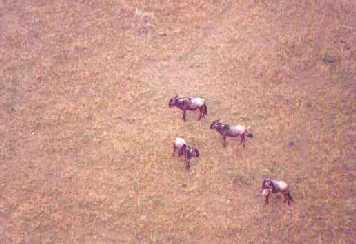 wildebeest seen from above
wildebeest seen from above
Unfortunately, there weren't a lot of animals out on this rainy Sunday.
We spotted a distant rhino, various antelope, and a few wildebeest. Sometimes
the balloons got close to the ground, so we seemed to be only a few feet above
the animals. The thrill was in the ride over the plains, and finally in the
deliberate tipping of the basket when we set down.
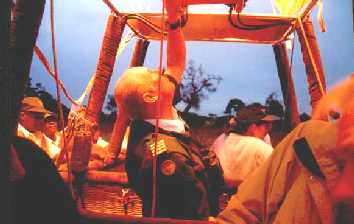 driving the balloon
driving the balloon
The balloon company collected us. Our ride had taken just under an
hour. The next hour was spent eating a simple brunch, while the balloon company
tried to sell us souvenirs.
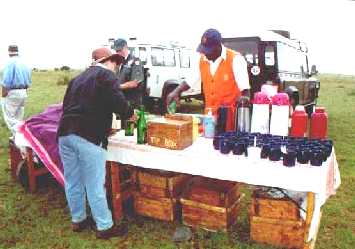 brunch
brunch
"At $400 a head," I thought, "they should be giving us souvenirs."
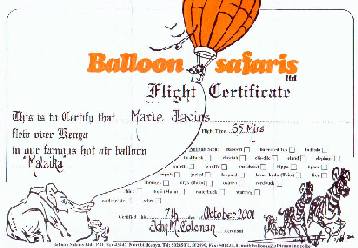 certificate of successful balloon trip
certificate of successful balloon trip
But I couldn't really complain. I had known in advance that the price
was ludicrous and had deliberately allowed myself the rip-off. I'd been in a
balloon over Masai Mara now. I wouldn't need to do it again.
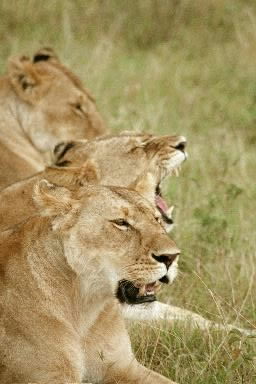 Masai Mara king of the plains
Masai Mara king of the plains
Amos drove me past lion and wildebeest on the way back to Planet's
campsite. The terminally dense Paul drove Hannah and me back to Nairobi in late
afternoon.
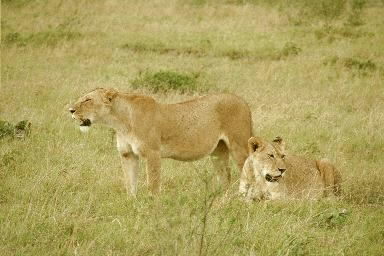
NAIROBI
OCTOBER 8 TO 10
As I learned to navigate the streets of Nairobi, I became subjected
less frequently to the scams of Kenya's main city. I walked with confidence and
learned to take buses and matatus. Nairobi was expensive for a cheap city, and
anything of quality had a corresponding inflated price tag.
After seeing the Masai all dressed in city clothes and staring with
concern at CNN as the first US bombs dropped on Afghanistan, I headed out Ngong
Road in a matatu. My plan was to go to Karen Blixen's home, followed by a trip
to feed giraffes at the Langata Giraffe Center. But I got stuck at Karen
Village when public transport didn't do my bidding, and returned to the
Parkside in defeat.
At the Westlands Mall, a fashionable Kenyan man made me a blond again,
while laughing at the price the Hilton hair salon had quoted me. They'd wanted
$70 just to bleach my roots. I wouldn't even pay that at home, I explained.
My Westlands hairdresser was surprised that the Hilton colorist hadn't
invited me to her home, to do my hair privately at a steep discount. Everyone
in Nairobi seemed to have an innovative way of making money on the side.
Similarly, when I went to buy a small lightweight tent, the salesman
had an idea. They were sold out of tents, he explained, but he could get me a
used one at a good price. I watched as he fudged some forms and "rented" me a
tent. The deposit more than paid for the tent that I said up front I would not
be returning, and the salesman charged me an additional fee to sew up the holes
and work out the forms.
Then, the salesman at a souvenir shop finalized my education in
Nairobi's economy. I had been hunting for a specific type of Congolese textile
as a souvenir for Michael, the Australian bug-eating champion I'd met in China. The only one I'd seen to
date had been under glass at the Dar Es Salaam Sheraton. Now, the ones I founds
in the African gallery were $35 each.
"That's too much," I told the salesman. Later, he met me at an internet
cafe and sold me textiles at half-price. He had gotten them directly from the
supplier and bypassed the shop.
Out in Westlands, I hunted amongst the souvenir stands for wooden
hippos for Richard Starkings. Word had spread like wildfire that I was looking at hippos and everyone waved hippos at me from their shops.
"Where are you from?" asked a seller.
"New York," I said.
He clucked and shook his head.
"Osama was very bad," smiled the seller, as if his personal friend
Osama bin Laden were a naughty boy who needed to be put in a corner.
Later, an Arabic-Kenyan told me simply "they need to kill him."
I walked to the nearbySarit Centre where two men giving away puppies
targeted me. I happily borrowed the puppies and cuddled them, but still had to
return them for the heartbreaking walk away. The men spoke no English, and had
no idea what I meant when I explained why I couldn't possibly take the little
dogs. There was a dermatologist on the top floor of the Sarit Centre, so I
dropped by to see what she made of the swollen lump on my upper left arm. It
had appeared concurrent with my second rabies vaccine in Berlin, and I was
certain it didn't belong there.
"Keep an eye on it," were the dermatologist's instructions. I didn't
want to keep an eye on it. I wanted it gone.
The matatu that took me back downtown was blasting Kenyan rap through
its bass-heavy speakers. The African rap sounded unsophisticated to my American
ears. How funny, I thought, that the African influence on American pop culture
had come full circle to where American culture was as influential in Africa as
Africa had been, in turn, on America.
On my last scheduled night in Nairobi, I had dinner with Howard and
Sonia, an expat couple that were friends of a friend. Their home, car,
children, and furnishings were all gorgeous. Their kids attended an American
school and had all the conveniences of life at home, but appeared insulated
from the worst excesses of life back in the States. We had a Thai dinner, and
they dropped me off back at the Parkside.
"That's the terrorist hotel!" exclaimed Sonia. The terrorists who had
bombed the US Embassy had stayed at the Parkside. I hoped they hadn't stayed in
room 407.
OCTOBER 11 TO 13
I got my laundry back from Parkside. Someone had used bleach on my
lightweight Columbia trousers and they were disintegrating. I rushed them to a
tailor for Frankenstein-like stitches. They couldn't be replaced here and had
seven weeks to go before retirement.
Likewise, my Manhattan Portage bike messenger bag went into the canvas
shop for reconstruction. I'd sewn up its slit several times since it had been
slashed in Ulaan Bataar, and it was time for a proper repair job.
At ten, I headed to the 680 Hotel on Kenyatta Avenue. I'd had delicious
Japanese food there two days ago, but was going this time to meet a group.
"Dragoman" was taking me north through Lake Turkana and Ethiopia. I had bought my tent and brought along a Thermarest solely for the camping on this overland trip.
"PAZ," a smallish white truck with the standard-issue Dragoman orange
stripe and "discover the dream" slogan painted on its side, sat in front of the
680. I'd been crossing paths with PAZ ever since Namibia and was surprised that
it was going to be my home for the next month and a half.
I hated the "discover the dream" marketing campaign. When I'd taken my
first Dragoman trip in '96, they hadn't made any heady claims about discovering
dreams or changing lives. In my experience, holidays don't permanently change
people. It takes commitment and strong character to affect a lifestyle change,
not six months of flapping plates dry after a picnic with fellow westerners.
Inside the 680, two men sat on a terrace. They were slightly unkempt,
with sun-worn faces, and clean but old clothing. They looked like Dragoman
drivers so I sat down and introduced myself.
Mark was the leader, and my friend Nikki the ex-Dragoman driver had
told me about him in advance. He was Dragoman's Ethiopia expert, and, at 37,
had been Drago-driving for over eight years. Nikki trusted him, so I knew I was
in capable hands.
Tony was co-driving. He was equally capable, and had trained with Nikki
some four or five years ago. She'd moved on to leading groups around South
America with "Tucan," and I suspected Tony might move on soon as well.
But the real surprise was that we were going to have a cook on board.
Wow! What a luxury! Presumably this meant I wouldn't be subjected to tuna-surprise twice a day.
The group for the Nairobi to Addis Ababa leg consisted of ten -- one
German, eight from the UK/Ireland, and me. Six had been together for weeks
already and it showed. They were cliquish and insular. Only one, a 21-year-old
builder named Trigger, showed interest in the new arrivals. Never mind, I
thought. Typical behavior for a group that's been traveling together. We'd all
get to know each other with time, and by the time we got new people in Addis,
we'd look equally cliquish to them.
Monica, a 31-year-old Scot, was my assigned roommate. She'd lived in
Norway and Azerbaijan in her work as a surveyor. Lucky Monica would get her own
tent, but we'd share when the group stayed in hotels.
Monica filled me in on yet-another-Nairobi-scam, one that I had somehow
missed out on.
A man had engaged her in conversation. After a minute, she'd managed to
extricate herself and move on. Then, a second man approached her, claiming to
be an undercover policeman. He was investigating the man she'd just spoken to,
and would she mind coming with him? Sensible Monica had refused to get in
the "policeman's" car and suggested they first discuss the matter with a nearby
uniformed policeman. The undercover "policeman" then let the matter drop and
vanished.
My new group, I told Mark, was going to have start without me. I'd
spent too much time looking at mountain gorillas and flying above Masai Mara
and had fallen behind on my web duties. I begged off Elsamere and Hell's Gate
park -- Born Free could live on without my visit. Mark agreed and suggested I
catch up with the group on Sunday in the town of Nakuru.
The group startled the trip without me, and I slaved away in the
internet cafe for two solid days. The taxi drivers began to surprise me by
saying "Parkside?" Waitresses started to greet me on the street.
On the second day, I was started to see a Dragoman truck outside the
680. But it wasn't PAZ. It was Oscar, identified by the OAZ on its license
plate. Oscar was the large, then-new truck that had carried me from Kathmandu
to Damascus in '98. Nikki had driven,
while Paul (who I'd recently met in Arusha) had co-driven.
 Oscar in Nairobi
Oscar in Nairobi
A driver was climbing out of Oscar.
"Excuse me," I said. He looked at me apprehensively.
"Is this truck Oscar?" I asked.
"Yeah..." The driver started to smile.
"This truck took me through the Middle East," I explained. "He's had a
few modifications since then."
Oscar was older and more distinguished. He had a wood rack added to his
back, padlocks on the driver's doors, and had the word "Oscar" written on his
side in Ethiopian Amharic.
"It's the Ethiopia truck," explained the driver. "But Oscar is sick so
he has to be shipped back to the UK from Durban."
What a pity. I quite liked the idea that my old friend Oscar would take
me through Ethiopia. Plus, he was a lot bigger than PAZ.
I left 680 and walked for a coffee. The same man who had called me
a "son of a bitch" earlier in the week addressed me.
"Still walking, huh?"
"You already tried this once," I responded, smiling.
"Son of a bitch," he said and strode away.
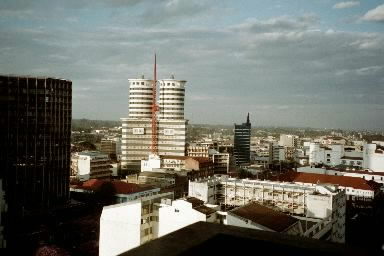 Nairobi
Nairobi
I wasn't ready to leave Nairobi yet. I was just getting comfortable
with it. I was just getting used to the smell of the city where you could only
buy deodorant, not anti-perspirant. People were just starting to recognize and
greet me. But the Dragoman truck was heading north to Ethiopia, and if I missed
it, I'd have to hitch a ride on a desert cargo truck. In spite of my contempt
for group activities, I knew I had to go with Dragoman. I went back to the
Parkside and packed my bags.
NEXT: Watch Marie immediately lose patience with group fun! See Charles punch a camel and find out the point-of-departure for a 16-ton truck stuck on its side in clay in "Where the Pavement Ends."